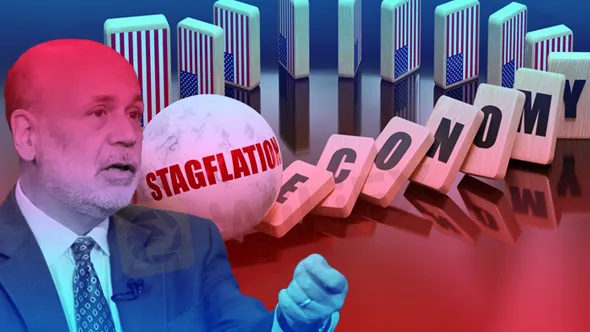简体中文
繁體中文
English
Pусский
日本語
ภาษาไทย
Tiếng Việt
Bahasa Indonesia
Español
हिन्दी
Filippiiniläinen
Français
Deutsch
Português
Türkçe
한국어
العربية
Bernanke Warns US Could Experience 'Stagflation'
Abstract:The U.S. could be heading for “stagflation,” and “a slowing economy” over the next year or two.

Former Federal Reserve Chair Ben Bernanke told The New York Times on Monday that the U.S. could be heading for “stagflation,” and “a slowing economy” over the next year or two.
Bernanke told the Times that he hopes the current Federal Reserve chair, Jay Powell, will find a way to limit inflation, but he noted that “even under the benign scenario, we should have a slowing economy.”
According to Bernanke, “Inflation's still too high but [it's] coming down. So there should be a period in the next year or two where growth is low, unemployment is at least up a little bit and inflation is still high.”
He added, “So you could call that stagflation.”
Bernanke went on to say that “the difference between inflation and unemployment is that inflation affects just everybody. Unemployment affects some people a lot, but most people don't respond too much to unemployment because they're not personally unemployed. Inflation has a social-wide kind of impact.”
When asked about whether the Federal Reserve should pick another inflation target, Bernanke said: “Inflation targets should not be used as a short-run tool, you know? If you raise the inflation target to 3% for some short-term purpose, then why not 4%, or why not 3.5%, or why not create a band, or whatever?”
For more Forex news, please download WikiFX- the Global Broker Regulatory Inquiry APP.
Disclaimer:
The views in this article only represent the author's personal views, and do not constitute investment advice on this platform. This platform does not guarantee the accuracy, completeness and timeliness of the information in the article, and will not be liable for any loss caused by the use of or reliance on the information in the article.
Read more

FED meeting minutes strongly hint at a rate cut in September; US dollar index falls to new low this year!
The U.S. Bureau of Labor Statistics revised down the employment growth in the year ending in March by 818,000, an average monthly decrease of about 68,000, the largest downward revision since 2009. The substantial downward revision of employment data re-emphasized the severity and necessity of the U.S. employment problem, paving the way for a rate hike in September. Bearish for the U.S. dollar.

What new signals does the Federal Reserve have? FED Governor Michelle Bowman reiterates the risk of inflation!
Fed Governor Bowman: There are upside risks to inflation, the labor market continues to strengthen, and a cautious attitude will be maintained at the September meeting. Boston Fed President Collins: If the data is as expected, it would be appropriate to start easing policy "soon". Inflationary pressure will slow down the pace of U.S. interest rate cuts, which will be bullish for the dollar.

GEMFOREX - weekly analysis
The week ahead: Traders on the backfoot ahead of a quiet week

Twin Scam Alert: Broker Capitals is a New Domain of Finex Stock
This week, the Italy financial regulator CONSOB issued a warning against an unlicensed broker named Broker Capitals. When we clicked on Broker Capitals' website, its logo, trade name, and design seemed familiar to us.
WikiFX Broker
Latest News
The Withdrawal Trap: How Scam Brokers Lure Victims into Paying More
FCA to Investors: Think Twice Before Trusting These Brokers
Trump\s tariffs: How could they affect the UK and your money
Trump gambles it all on global tariffs he\s wanted for decades
TradingView Brings Live Market Charts to Telegram Users with New Mini App
Trump tariffs: How will India navigate a world on the brink of a trade war?
IG Group Acquires Freetrade for £160M to Expand UK Investment Market
U.S. March ISM Manufacturing PMI Released
Should You Beware of Forex Trading Gurus?
Vanuatu Passes VASP Act to Regulate Crypto and Digital Assets
Currency Calculator







